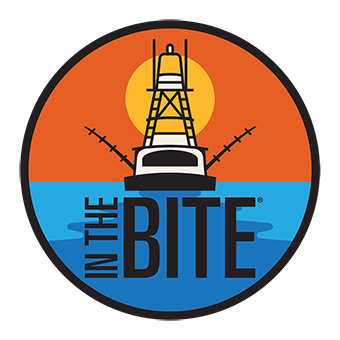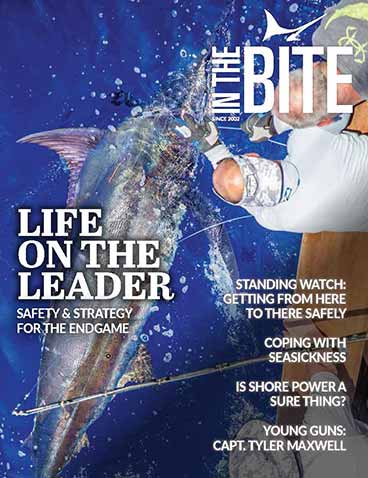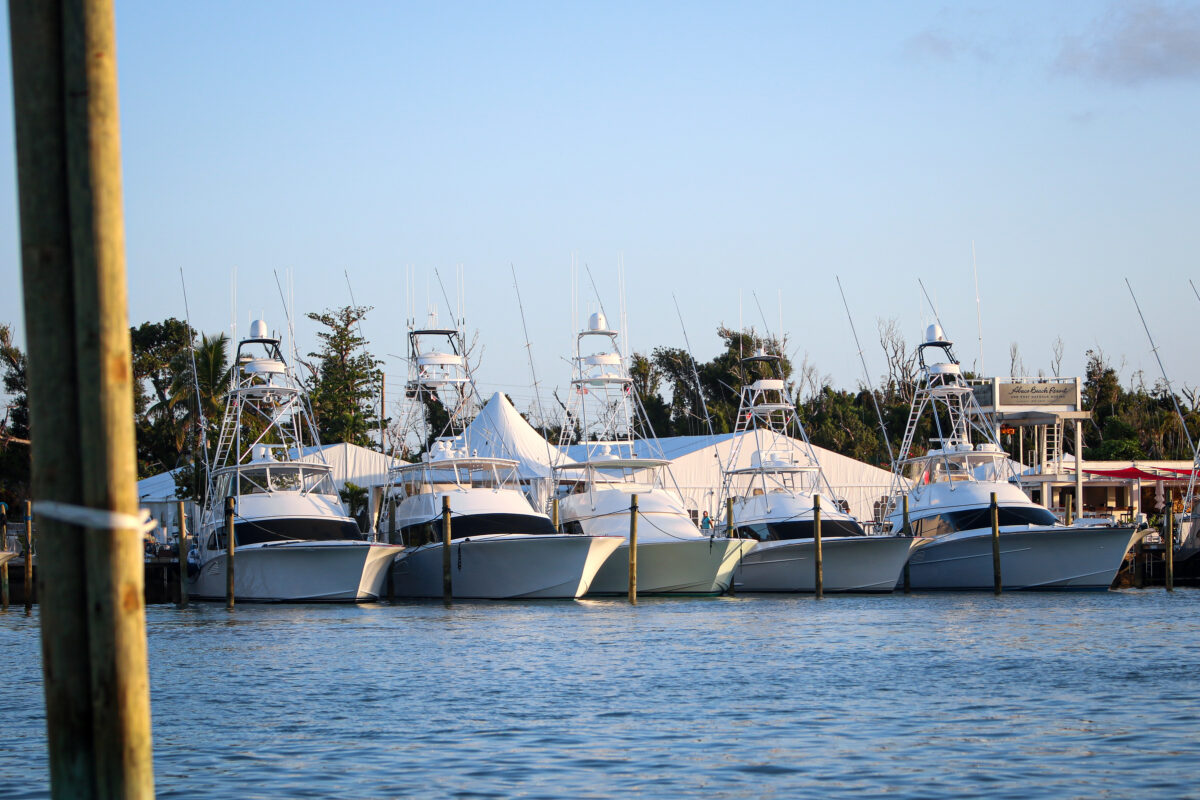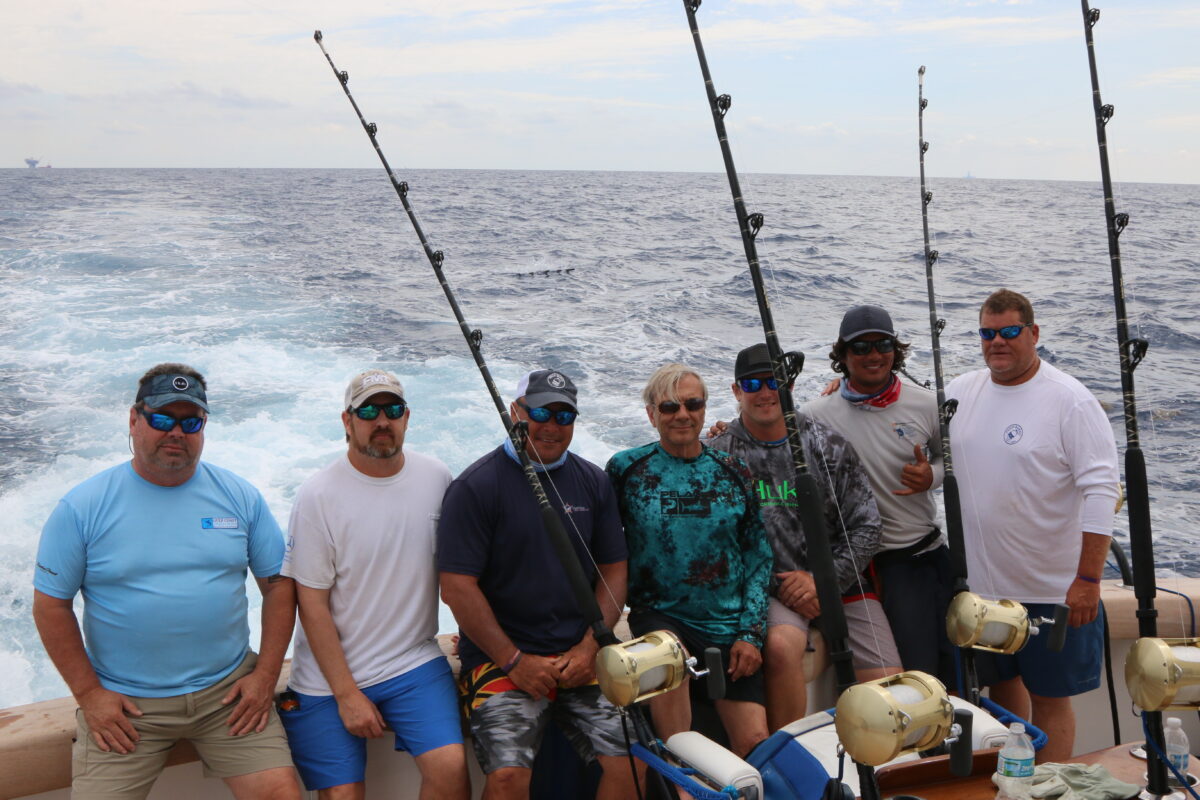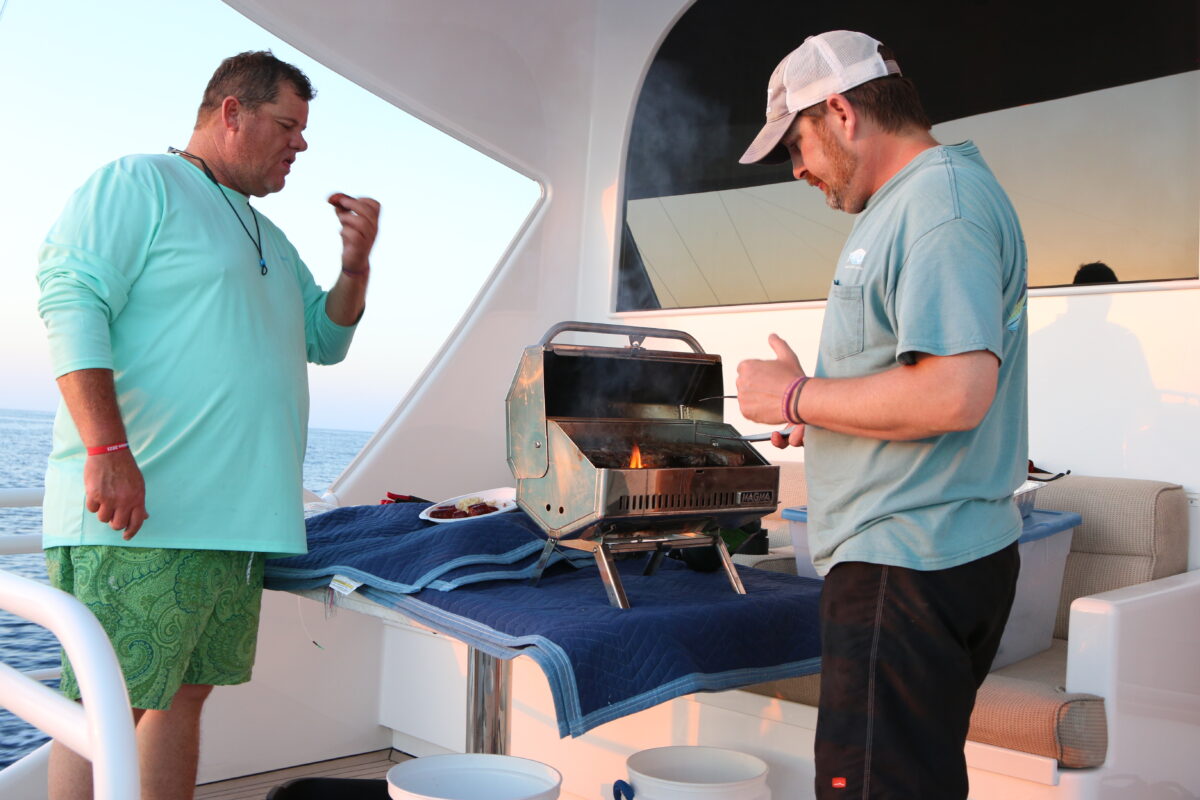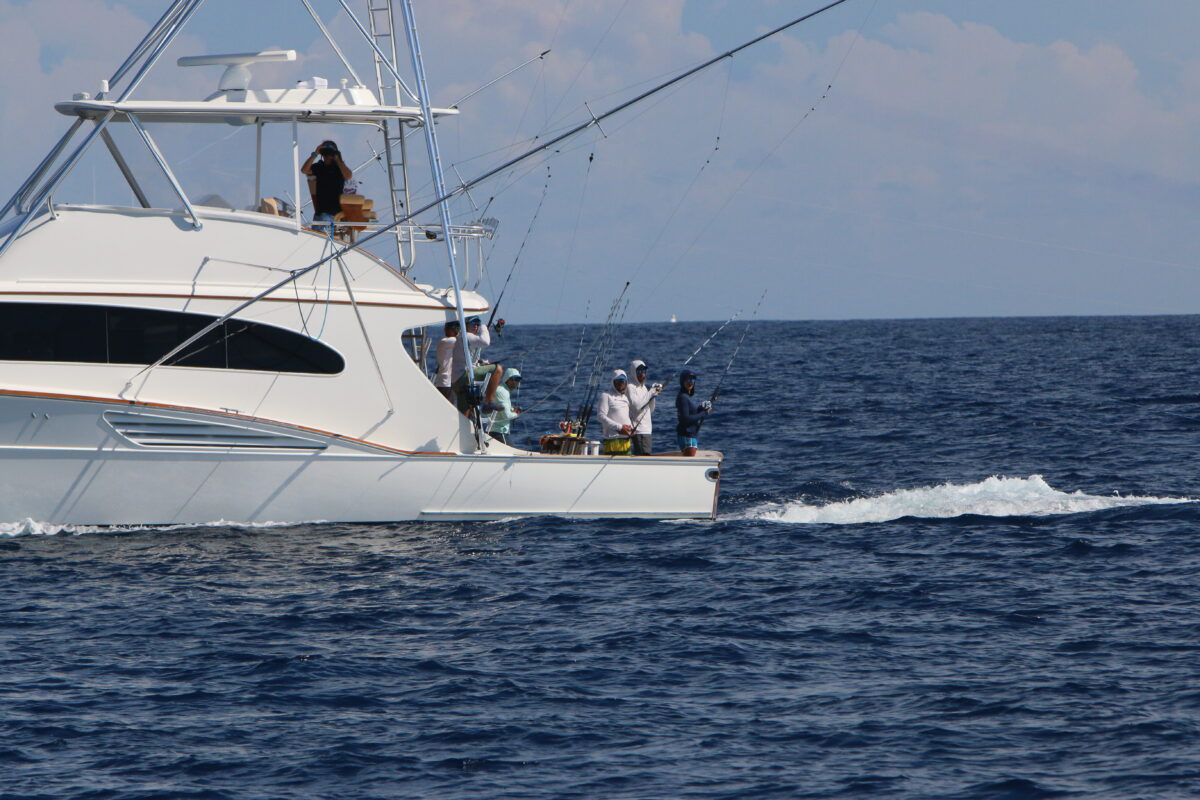
This article appeared in our June 2017 edition of InTheBite The Professionals Sportfishing Magazine. Subscribe Today!
 Surveyors See Everything
Whether Buying or Selling, A Good Surveyor Sweetens the Deal
by Dave Ferrell
Few purchases require more due diligence than buying a multi-million dollar sportfisher. Even center console boats are stretching out past 40-feet and now come with convertible-class price tags. Not only a large financial commitment, a sportfisherman represents a huge mystery to most of those with the wherewithal to afford one. As most people dont earn their living building boats, it unlikely that you would be an expert on whether that sportfisher you have your eye on has or has not been abused in some way by its previous owner. While everyone knows a bit about houses, only a few professionals are familiar with the complex systems, space-age hull materials and powerful diesel engines that keep a sport fishing yacht operating safely¦ and there is much more at stake than the vessel price tag. After all, you dont leave the relative safety of land and travel thousands of miles over open water in your house.
Sportfishers are chocked full of variables, many of which are highly technical. Cramped spaces, extreme temperatures and unseen voids can combine to make even a small vessel a labyrinth of hidden disasters or potential problems yet to fester into full-blown catastrophes. On the other side of that coin, you might find one of those hidden jewels with excellent pedigree and unmatched maintenance documentation that makes the vessel worth considerably more than the asking price. In either case, whether you are selling your one-time dream boat to upgrade, or are looking to make your first purchase to start your offshore career, it always in your best interest to hire a well-respected marine surveyor.
According to Capt. George Sawley, longtime skipper of the Stalker, skiff builder and part time boat broker, As much as I know about how to break boats and maintain them, a surveyor knows about finding out what wrong and right with a boat. That their focus; that what they do. We talk about good fishing spots¦these guys talk about the breakage theyve seen on certain models. They have a much better baseline to go by, and they might have a 300-item list in their head. I dont have that list.
Surveyors See Everything
Whether Buying or Selling, A Good Surveyor Sweetens the Deal
by Dave Ferrell
Few purchases require more due diligence than buying a multi-million dollar sportfisher. Even center console boats are stretching out past 40-feet and now come with convertible-class price tags. Not only a large financial commitment, a sportfisherman represents a huge mystery to most of those with the wherewithal to afford one. As most people dont earn their living building boats, it unlikely that you would be an expert on whether that sportfisher you have your eye on has or has not been abused in some way by its previous owner. While everyone knows a bit about houses, only a few professionals are familiar with the complex systems, space-age hull materials and powerful diesel engines that keep a sport fishing yacht operating safely¦ and there is much more at stake than the vessel price tag. After all, you dont leave the relative safety of land and travel thousands of miles over open water in your house.
Sportfishers are chocked full of variables, many of which are highly technical. Cramped spaces, extreme temperatures and unseen voids can combine to make even a small vessel a labyrinth of hidden disasters or potential problems yet to fester into full-blown catastrophes. On the other side of that coin, you might find one of those hidden jewels with excellent pedigree and unmatched maintenance documentation that makes the vessel worth considerably more than the asking price. In either case, whether you are selling your one-time dream boat to upgrade, or are looking to make your first purchase to start your offshore career, it always in your best interest to hire a well-respected marine surveyor.
According to Capt. George Sawley, longtime skipper of the Stalker, skiff builder and part time boat broker, As much as I know about how to break boats and maintain them, a surveyor knows about finding out what wrong and right with a boat. That their focus; that what they do. We talk about good fishing spots¦these guys talk about the breakage theyve seen on certain models. They have a much better baseline to go by, and they might have a 300-item list in their head. I dont have that list.
 Not All Created Equal
There are nearly as many kinds of marine surveyors as there are boats. Most specialize in a certain areas, systems or boat types. The degree of specialization is surprising; they range from wooden boat surveyors, damage and insurance specialists, cargo survey specialists, pre-purchase, marine engine surveyors and even rigging surveyors for sailboats. Some make their living working for and defending the interests of insurance companies, while others prefer to work on the side of the injured party, or owner of the vessel.
The buyer is traditionally the one who chooses the surveyor and pays the fee, whether the sale of the boat goes through or not. However, you also need a surveyor when it time to renew your insurance policy. Once you own the boat, your insurance company will request a survey every few years to make sure that the boat is sound and is holding the insured value. They also do a thorough check of all your safety systems, says Sawley.
Whatever your needs, when picking a surveyor it a good idea to choose one that is a member of either the Society of Accredited Marine Surveyors (SAMS) or the National Association of Marine Surveyors. These two organizations require testing and continuing education credits to keep your credentials, so it likely that a surveyor belonging to one of these organizations will be up to speed on the latest issues.
According to Steve Klaity, owner of South Florida Marine Surveyors, There are many different paths to a marine surveying job and anybody can call themselves a marine surveyor. But to have your surveys accepted by banks and insurance companies you need to be accredited. There are two or three major societies and a couple of lesser known ones. Im number 363 in SAMS and the first 200 are dead! Now we have over 1,400 members worldwide. You have to put in an apprenticeship, spend time as an SA or survey associate, pass certain tests and attend annual meetings to stay current.
Not all surveyors are full-time however, A lot of older fellows will do one or two surveys a year, says Klaity. When people first get into it they think this job is going to be a piece of cake¦it not. After spending a good eight hours onboard for the inspection and sea trial, Klaity usually spends another four or five hours on the computer typing up a report that typically runs about 26-pages for a 50-foot sportfisher! If the boat is a wreck is can be a lot longer, says Klaity.
Klaity specializes in sportfishers because, as he puts it, The people are more logical and that where my true interests lie. He also prefers to work for boat owners rather than insurance companies. While some people make a fulltime career out of working for the insurance companies, I like working for the client [boat owner]. It a lot more rewarding to make the insurance companies pay what they are supposed pay. Also, I dont have to wait 30 days or more to get paid. With a boat owner, I hand them the report and the bill and get paid right away.
Capt. Jimmy Fields, owner of Tournament Yacht Sales, says A good broker wont be biased to a surveyor. I give my buyers at least three names to choose from. You want the buyer to pick the surveyor. If I steer you to a guy Ive been working for your years it just looks funny. This helps avoid any conflict of interest. And if something gets missed or goes wrong, the first thing they are going to do is point the finger at you. What I look for in a surveyor on both sides really is knowledge of the product. Ive narrowed it down to a few guys I like, but they are all knowledgeable about the kinds of boats that I sell. Custom boats more so than production. I sell a lot of both, but some of these surveyors have never been on a Paul Spencer, Paul Mann or a Ricky Scarborough. As you know, every Carolina boat is built different ¦ hence the word custom. They use different materials, different wiring hookups and if theyve never seen these things before then they are not as knowledgeable¦and it can affect the deal¦big time.
Issues of Concern
A good surveyor needs to look at everything and every boat is different. There not really one thing you focus on, but you pay close attention to the safety equipment ” fire extinguishers, anchoring gear, bilge pumps, life rafts, etc. Then you move on to the engines and the hull bottom. If the bottom is not good it doesnt matter what in it! When you have a cored boat, you want to make sure that the core is not wet, says Klaity.
Sawley says, You want to hire a surveyor that knows your boat manufacturer¦and that understands the particulars of those boats. Sometimes a stress crack is more cosmetic rather than structural. Maybe some movement in this spot is not detrimental to the safety of the vessel. Another guy can come in and blow these things completely out of proportion. If Im the seller, Im worried about someone making a big deal out of nothing. There obviously some tip-toeing going on around every sale or purchase. Ive never been on a boat where every system was 100 percent. If you are captain you are going to focus on the major issues¦not something like a light switch that can break daily.
Instead of trying to nitpick a boat apart, Sawley feels that a good surveyor should focus on long term issues. A boat survey is only a shot in time¦you have to keep an eye out for long-term signs of neglect. When you go down below on a boat and they say theyve never had an issue, and you see half the bolts have the paint busted off them, you need to start looking for a paper trail that details what work was done or the severity of the issue. If someone says they rebuilt the engines, but all they did was put some new cylinder kits in it, within new heads or new water pumps then it not really a re-build and it your job to find those things out. You have to go in to slice and dice and find out what went on.
Obviously, I want someone who is very thorough, but I also want someone who is very verbal, says Fields. I like them to sit down with the buyer midstream and when the survey is over to explain what theyve found. Not just put it in an email and send it off. They have to put certain things on there to satisfy their organizations, but if you dont know what these things mean, it can sound like the boat is going to sink! A novice buyer can get spooked and it can tank a deal. I like the fact that the guys I use will sit down and explain things.
What I dont like is when a surveyor quotes prices, says Fields. That a major no-no in my industry. Theyll say, ˜Well it will take $80,000 to fix this crack in the engine room. They are not boat builders, they are boat surveyors. They are paid to find things that are wrong and to pass them on to the owner and buyer so that they, along with the broker, can go and get quotes on repairs. When these guys start quoting prices to my buyers it can absolutely torpedo a deal.
Not All Created Equal
There are nearly as many kinds of marine surveyors as there are boats. Most specialize in a certain areas, systems or boat types. The degree of specialization is surprising; they range from wooden boat surveyors, damage and insurance specialists, cargo survey specialists, pre-purchase, marine engine surveyors and even rigging surveyors for sailboats. Some make their living working for and defending the interests of insurance companies, while others prefer to work on the side of the injured party, or owner of the vessel.
The buyer is traditionally the one who chooses the surveyor and pays the fee, whether the sale of the boat goes through or not. However, you also need a surveyor when it time to renew your insurance policy. Once you own the boat, your insurance company will request a survey every few years to make sure that the boat is sound and is holding the insured value. They also do a thorough check of all your safety systems, says Sawley.
Whatever your needs, when picking a surveyor it a good idea to choose one that is a member of either the Society of Accredited Marine Surveyors (SAMS) or the National Association of Marine Surveyors. These two organizations require testing and continuing education credits to keep your credentials, so it likely that a surveyor belonging to one of these organizations will be up to speed on the latest issues.
According to Steve Klaity, owner of South Florida Marine Surveyors, There are many different paths to a marine surveying job and anybody can call themselves a marine surveyor. But to have your surveys accepted by banks and insurance companies you need to be accredited. There are two or three major societies and a couple of lesser known ones. Im number 363 in SAMS and the first 200 are dead! Now we have over 1,400 members worldwide. You have to put in an apprenticeship, spend time as an SA or survey associate, pass certain tests and attend annual meetings to stay current.
Not all surveyors are full-time however, A lot of older fellows will do one or two surveys a year, says Klaity. When people first get into it they think this job is going to be a piece of cake¦it not. After spending a good eight hours onboard for the inspection and sea trial, Klaity usually spends another four or five hours on the computer typing up a report that typically runs about 26-pages for a 50-foot sportfisher! If the boat is a wreck is can be a lot longer, says Klaity.
Klaity specializes in sportfishers because, as he puts it, The people are more logical and that where my true interests lie. He also prefers to work for boat owners rather than insurance companies. While some people make a fulltime career out of working for the insurance companies, I like working for the client [boat owner]. It a lot more rewarding to make the insurance companies pay what they are supposed pay. Also, I dont have to wait 30 days or more to get paid. With a boat owner, I hand them the report and the bill and get paid right away.
Capt. Jimmy Fields, owner of Tournament Yacht Sales, says A good broker wont be biased to a surveyor. I give my buyers at least three names to choose from. You want the buyer to pick the surveyor. If I steer you to a guy Ive been working for your years it just looks funny. This helps avoid any conflict of interest. And if something gets missed or goes wrong, the first thing they are going to do is point the finger at you. What I look for in a surveyor on both sides really is knowledge of the product. Ive narrowed it down to a few guys I like, but they are all knowledgeable about the kinds of boats that I sell. Custom boats more so than production. I sell a lot of both, but some of these surveyors have never been on a Paul Spencer, Paul Mann or a Ricky Scarborough. As you know, every Carolina boat is built different ¦ hence the word custom. They use different materials, different wiring hookups and if theyve never seen these things before then they are not as knowledgeable¦and it can affect the deal¦big time.
Issues of Concern
A good surveyor needs to look at everything and every boat is different. There not really one thing you focus on, but you pay close attention to the safety equipment ” fire extinguishers, anchoring gear, bilge pumps, life rafts, etc. Then you move on to the engines and the hull bottom. If the bottom is not good it doesnt matter what in it! When you have a cored boat, you want to make sure that the core is not wet, says Klaity.
Sawley says, You want to hire a surveyor that knows your boat manufacturer¦and that understands the particulars of those boats. Sometimes a stress crack is more cosmetic rather than structural. Maybe some movement in this spot is not detrimental to the safety of the vessel. Another guy can come in and blow these things completely out of proportion. If Im the seller, Im worried about someone making a big deal out of nothing. There obviously some tip-toeing going on around every sale or purchase. Ive never been on a boat where every system was 100 percent. If you are captain you are going to focus on the major issues¦not something like a light switch that can break daily.
Instead of trying to nitpick a boat apart, Sawley feels that a good surveyor should focus on long term issues. A boat survey is only a shot in time¦you have to keep an eye out for long-term signs of neglect. When you go down below on a boat and they say theyve never had an issue, and you see half the bolts have the paint busted off them, you need to start looking for a paper trail that details what work was done or the severity of the issue. If someone says they rebuilt the engines, but all they did was put some new cylinder kits in it, within new heads or new water pumps then it not really a re-build and it your job to find those things out. You have to go in to slice and dice and find out what went on.
Obviously, I want someone who is very thorough, but I also want someone who is very verbal, says Fields. I like them to sit down with the buyer midstream and when the survey is over to explain what theyve found. Not just put it in an email and send it off. They have to put certain things on there to satisfy their organizations, but if you dont know what these things mean, it can sound like the boat is going to sink! A novice buyer can get spooked and it can tank a deal. I like the fact that the guys I use will sit down and explain things.
What I dont like is when a surveyor quotes prices, says Fields. That a major no-no in my industry. Theyll say, ˜Well it will take $80,000 to fix this crack in the engine room. They are not boat builders, they are boat surveyors. They are paid to find things that are wrong and to pass them on to the owner and buyer so that they, along with the broker, can go and get quotes on repairs. When these guys start quoting prices to my buyers it can absolutely torpedo a deal.
 Deal Killers
While there as many ways to crush a boat sale as there are boats on the water, there are few things that will always make any deal go bad. I once had a group start fighting over a turtle statue in the salon, said Fields, but furniture isnt his biggest worry. The one thing that probably kills more deals than anything else is a boat failure to get the proper number of turns or reach the right speeds. If it wont get the proper rpms or has metal in the oil samples it going to be tough to complete the sale. If you show up for the survey and the boat wont turn over the deal is shot.
Sawley agrees and says that you shouldnt even schedule a survey until the boat is ready. You need to make sure the bottom is clean and that the props are correct and clean. If you are not getting the turns you want, then you need to reschedule. Once everything is clean and running right you can usually walk through a sale rather easily, with a just a few minor adjustments.
Sometimes, however, the boat not the problem when it comes to closing a sale. I find the biggest problem is when you have two parties with the inability to negotiate, says Klaity. You have one guy who thinks his boat is worth more than it really is and another guy who doesnt want to pay it. These deals can get ridiculous; guys wanting the brokers to throw in their commissions, etc. That why I like to hand in my report, go over the details with the client and be on my way.
It often said that a boat owner two happiest days are the day he buys his boat and the day he sells it. Either way, that happiness comes a lot easier when you hire the right surveyor for the job at hand.
The HMY Perspective
Tim Gredick is a veteran broker at HMY Yachts. He is based in Charleston, South Carolina. When asked about the importance of a surveyor, he responds simply, I certainly wouldnt buy a boat without one. It important to understand what youre getting into. All yachts look good at the dock, but until you have a surveyor test the vessel systems and sea trial her, it hard to really know if you have any issues. Tim provides a list of considerations for the survey process.
Deal Killers
While there as many ways to crush a boat sale as there are boats on the water, there are few things that will always make any deal go bad. I once had a group start fighting over a turtle statue in the salon, said Fields, but furniture isnt his biggest worry. The one thing that probably kills more deals than anything else is a boat failure to get the proper number of turns or reach the right speeds. If it wont get the proper rpms or has metal in the oil samples it going to be tough to complete the sale. If you show up for the survey and the boat wont turn over the deal is shot.
Sawley agrees and says that you shouldnt even schedule a survey until the boat is ready. You need to make sure the bottom is clean and that the props are correct and clean. If you are not getting the turns you want, then you need to reschedule. Once everything is clean and running right you can usually walk through a sale rather easily, with a just a few minor adjustments.
Sometimes, however, the boat not the problem when it comes to closing a sale. I find the biggest problem is when you have two parties with the inability to negotiate, says Klaity. You have one guy who thinks his boat is worth more than it really is and another guy who doesnt want to pay it. These deals can get ridiculous; guys wanting the brokers to throw in their commissions, etc. That why I like to hand in my report, go over the details with the client and be on my way.
It often said that a boat owner two happiest days are the day he buys his boat and the day he sells it. Either way, that happiness comes a lot easier when you hire the right surveyor for the job at hand.
The HMY Perspective
Tim Gredick is a veteran broker at HMY Yachts. He is based in Charleston, South Carolina. When asked about the importance of a surveyor, he responds simply, I certainly wouldnt buy a boat without one. It important to understand what youre getting into. All yachts look good at the dock, but until you have a surveyor test the vessel systems and sea trial her, it hard to really know if you have any issues. Tim provides a list of considerations for the survey process.
- An Accredited Marine Surveyor is needed to obtain marine insurance and a market value for financing, he says.
- A good broker will provide guidance to customers in selecting the proper surveyor for their needs. I recommend a few surveyors, that specialize in the style of boat we are purchasing, for the buyers to interview and hire. There is a big difference in each builder construction methods and materials, whether youre looking at a production or custom boat. A surveyor who specializes in the type of vessel in question can help provide the buyer with better, more thorough information than a general surveyor who is not as familiar with that type of boat, Gredick describes.
- I also recommend an engine survey, separate from the boat survey. A significant portion of the vessel value is in the engines. Each engine manufacturer has different service intervals, warranties and methods for inspecting and measuring performance, Tim advises.
- Attending the survey will help educate the purchaser and captain on their future vessel. If you cant make the survey, be sure you sea trial the vessel to get a feel for her sea-keeping characteristics, he adds wisely.
While virtually anyone can hang a shingle as a boat surveyor, you want to make sure you choose one with the proper credentials. The two major organizations that you should choose from are the Society of Accredited Marine Surveyors (SAMS) or the National Association of Marine Surveyors (NAMS). For a list of accredited surveyors in your area, visit www.namsglobal.org or www.marinesurvey.org. For more, contact Steve Klaity at South Florida Marine Surveyors at 954-975-5149.
